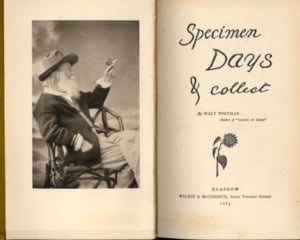
Delaware River—Days and Nights Walt Whitman
На этой странице вы найдете полный текст песни "Delaware River—Days and Nights" от Walt Whitman. Lyrxo предлагает вам самый полный и точный текст этой композиции без лишних отвлекающих факторов. Узнайте все куплеты и припев, чтобы лучше понять любимую песню и насладиться ею в полной мере. Идеально для фанатов и всех, кто ценит качественную музыку.

April 5, 1879.-With the return of spring to the skies, airs, waters of the Delaware, return the sea-gulls. I never tire of watching their broad and easy flight, in spirals, or as they oscillate with slow unflapping wings, or look down with curved beak, or dipping to the water after food. The crows, plenty enough all through the winter, have vanish'd with the ice. Not one of them now to be seen. The steamboats have again come forth—bustling up, handsome, freshly painted, for summer work—the Columbia, the Edwin Forrest, (the Republic not yet out,) the Reybold, Nelly White, the Twilight, the Ariel, the Warner, the Perry, the Taggart, the Jersey Blue—even the hulky old Trenton—not forgetting those saucy little bull-pups of the current, the steamtugs.
But let me bunch and catalogue the affair—the river itself, all the way from the sea—Cape island on one side and Henlopen light on the other—up the broad bay north, and so to Philadelphia, and on further to Trenton;—the sights I am most familiar with, (as I live a good part of the time in Camden, I view matters from that outlook)—the great arrogant, black, full-freighted ocean steamers, inward or outward bound—the ample width here between the two cities, intersected by Windmill island—an occasional man-of-war, sometimes a foreigner, at anchor, with her guns and port-holes, and the boats, and the brown-faced sailors, and the regular oar-strokes, and the gay crowds of "visiting day"—the frequent large and handsome three-masted schooners, (a favorite style of marine build, hereabout of late years,) some of them new and very jaunty, with their white-gray sails and yellow pine spars—the sloops dashing along in a fair wind—(I see one now, coming up, under broad canvas, her gaff-topsail shining in the sun, high and picturesque—what a thing of beauty amid the sky and waters!)—the crowded wharf-slips along the city—the flags of different nationalities, the sturdy English cross on its ground of blood, the French tricolor, the banner of the great North German empire, and the Italian and the Spanish colors—sometimes, of an afternoon, the whole scene enliven'd by a fleet of yachts, in a half calm, lazily returning from a race down at Gloucester;—the neat, rakish, revenue steamer "Hamilton" in mid-stream, with her perpendicular stripes flaunting aft—and, turning the eyes north, the long ribands of fleecy-white steam, or dingy-black smoke, stretching far, fan-shaped, slanting diagonally across from the Kensington or Richmond shores, in the west-by-south-west wind.
But let me bunch and catalogue the affair—the river itself, all the way from the sea—Cape island on one side and Henlopen light on the other—up the broad bay north, and so to Philadelphia, and on further to Trenton;—the sights I am most familiar with, (as I live a good part of the time in Camden, I view matters from that outlook)—the great arrogant, black, full-freighted ocean steamers, inward or outward bound—the ample width here between the two cities, intersected by Windmill island—an occasional man-of-war, sometimes a foreigner, at anchor, with her guns and port-holes, and the boats, and the brown-faced sailors, and the regular oar-strokes, and the gay crowds of "visiting day"—the frequent large and handsome three-masted schooners, (a favorite style of marine build, hereabout of late years,) some of them new and very jaunty, with their white-gray sails and yellow pine spars—the sloops dashing along in a fair wind—(I see one now, coming up, under broad canvas, her gaff-topsail shining in the sun, high and picturesque—what a thing of beauty amid the sky and waters!)—the crowded wharf-slips along the city—the flags of different nationalities, the sturdy English cross on its ground of blood, the French tricolor, the banner of the great North German empire, and the Italian and the Spanish colors—sometimes, of an afternoon, the whole scene enliven'd by a fleet of yachts, in a half calm, lazily returning from a race down at Gloucester;—the neat, rakish, revenue steamer "Hamilton" in mid-stream, with her perpendicular stripes flaunting aft—and, turning the eyes north, the long ribands of fleecy-white steam, or dingy-black smoke, stretching far, fan-shaped, slanting diagonally across from the Kensington or Richmond shores, in the west-by-south-west wind.
Комментарии (0)
Минимальная длина комментария — 50 символов.












